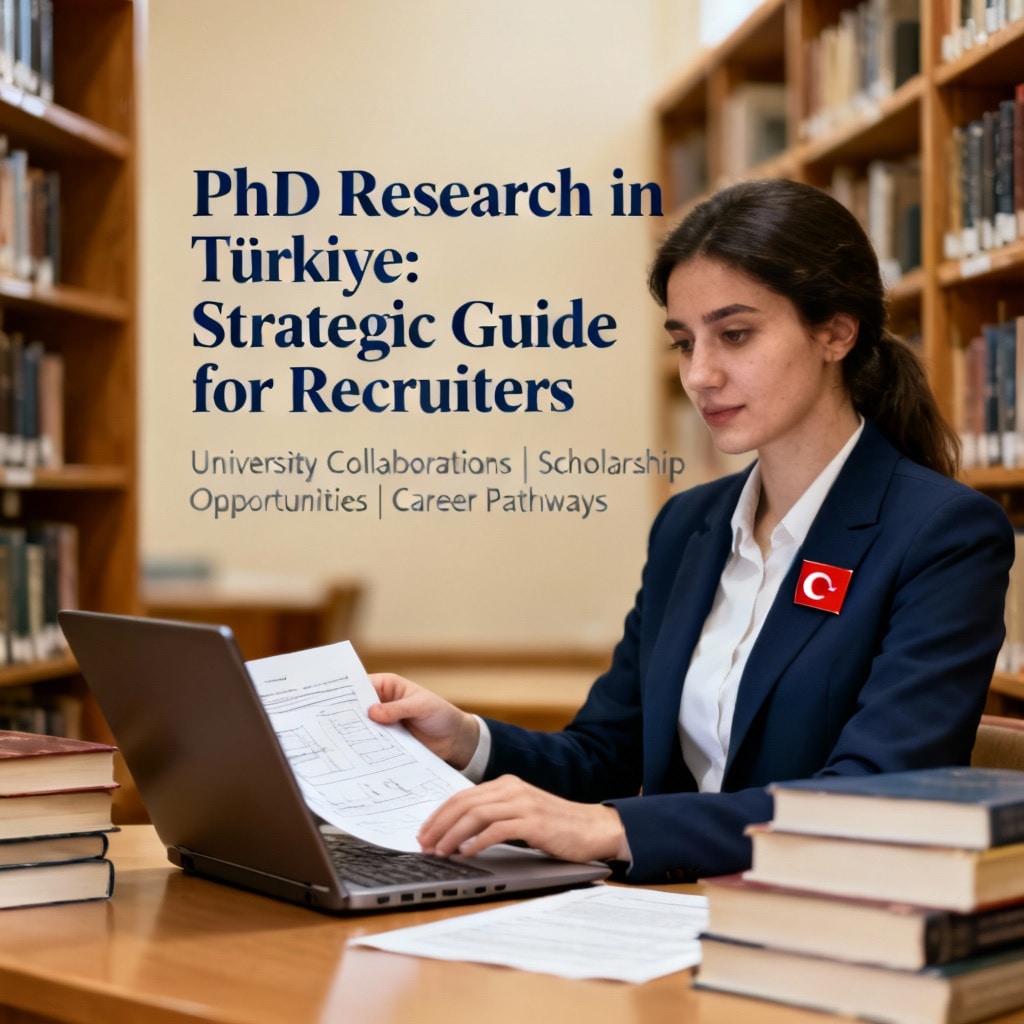PhD Research Opportunities in Türkiye: A Strategic Guide for International Recruiters and Admissions Teams
PhD Research Opportunities in Türkiye
PhD research opportunities in Türkiye are an increasingly important trend for international recruitment and higher education strategy. With hundreds of doctoral programs offered across public and foundation universities, Türkiye combines academic quality, English-language options, affordable costs, and growing international visibility—making it an attractive destination for doctoral candidates worldwide.
Why International PhD Candidates Choose Türkiye
- Affordability: Tuition fees and living costs in Türkiye are generally lower than in Western Europe and North America, improving yield for price-sensitive candidates.
- Language Flexibility: Many programs are offered in English and Turkish, expanding the applicant pool.
- Broad Disciplinary Coverage: Doctoral programs span engineering, health sciences, social sciences, humanities, arts, and technology.
- Strong Employment Outcomes: PhD holders gain access to academia, research institutes, industry R&D, government, and multinational firms.
- Scholarship and Funding Options: Institutional and national scholarships help attract competitive international scholars.
Key Institutional Examples
- Istanbul Medipol University – Medicine & Health Sciences
- Istinye University – Medicine & Health Sciences
- Ostim University – Engineering & Technology
- Ozyegin University – Engineering & Technology
- Uskudar University – Social Sciences, Psychology & Neuroscience
- Istanbul Bilgi University – Social Sciences, Psychology & Neuroscience
- Bahcesehir University – Interdisciplinary & Emerging Fields
- Galata University – Interdisciplinary & Emerging Fields
Program Structure and Typical Application Requirements
Most PhD programs in Türkiye follow a research-oriented model with institutional variation. For admissions teams, expect the following common elements:
- Duration and Format: Typically 2–4 years full-time (some part-time or flexible arrangements available).
- Curriculum Components: Advanced coursework, seminars, comprehensive exams (in some programs), research projects, and a dissertation supervised by a faculty advisor.
- Core Application Documents:
- Bachelor’s and Master’s diplomas (with transcripts).
- Research proposal (clear research question, methods, and timeline).
- Proof of language proficiency (English or Turkish as required).
- Recommendation letters and a motivation letter.
- CV and passport-sized photo.
- Standardized test scores where required (GRE, GMAT, ALES in some universities).
- Visa and immigration documentation for international candidates.
Actionable tip: Build an admissions checklist template that maps each program’s specific requirements to the standard list above—this reduces missing-document rates and accelerates offer decisions.
Operational Checklist
Candidate Sourcing and Targeting
- Target Markets: Focus on regions where Türkiye is already trending — Middle East, Africa, Central Asia, South Asia, and Europe.
- Disciplines to Prioritize: Health sciences, engineering, computer science, neuroscience, political science, and interdisciplinary innovation programs.
- University-Level Targeting: Use partner university strengths to segment campaigns.
Admissions Screening and Evaluation Best Practices
- Research Proposal Evaluation Rubric: Create a 5–7 point rubric to assess originality, feasibility, methodology, supervisor fit, and resource needs.
- Supervisor Capacity Check: Confirm faculty availability and funding for supervision to prevent later drop-offs.
- Language and Academic Readiness: Use structured interviews and short written tasks (e.g., literature critique) to verify research readiness.
Candidate Conversion and Offer Management
- Personalized Offer Packages: Combine scholarship, assistantship, and onboarding support in one offer document.
- Clear Pathways: Spell out course requirements, expected milestones, and administrative support (visa, housing, registration).
Compliance, Visas and Mobility
- Visa Process: International PhD candidates require a student visa and should be guided through immigration timelines.
- Credential Evaluation: Ensure foreign degrees are evaluated per Turkish requirements where applicable.
Marketing and Positioning
Messages that Convert
- Emphasize Research Facilities: Showcase labs, published research, and faculty profiles.
- Highlight English-Language Supervision: Make it clear which programs are offered fully in English.
- Demonstrate Career Outcomes: Use alumni placement stories and collaborative industry projects.
Channels and Campaigns
- Virtual Research Fairs and Webinars: Host thematic events tied to faculty research clusters.
- Agent Partnerships and University Reps: Collaborate with trained agents to reach regional markets.
- Digital Advertising and SEO: Use targeted search and social campaigns.
How Study in Türkiye Supports PhD Recruitment and Admissions
Lead Generation and International Recruitment Expertise
Study in Türkiye specializes in identifying high-quality international applicants and matching them to the right Turkish university programs.
Automation and Admissions Workflow Integration
Our automation capabilities streamline common admissions bottlenecks.
Partnering and Agency Model
If your organization wants to expand placement services or represent Study in Türkiye, explore our agent partnership program.
Practical Next Steps — A 90-Day Recruitment Plan for PhD Intake
Days 1–14: Program Mapping and Messaging
- Identify 6–8 target programs across partner universities.
- Create bespoke landing pages and a candidate checklist.
Days 15–45: Outreach and Engagement
- Run targeted webinars with faculty; publish program-focused content.
- Deploy paid search and social campaigns to priority markets.
Days 46–75: Screening and Interviews
- Use automated screening forms and schedule faculty interviews.
- Confirm supervisor availability and funding before issuing offers.
Days 76–90: Offers and Onboarding
- Send personalized offer packages with scholarship details.
- Provide visa guidance and pre-arrival resources.
Take the Next Step with Study in Türkiye
PhD research opportunities in Türkiye present a compelling proposition for international candidates—and a strategic growth area for recruiters, admissions teams, and placement agencies. By aligning program strengths, streamlining admissions workflows, and leveraging targeted marketing, institutions can attract high-quality doctoral candidates.

